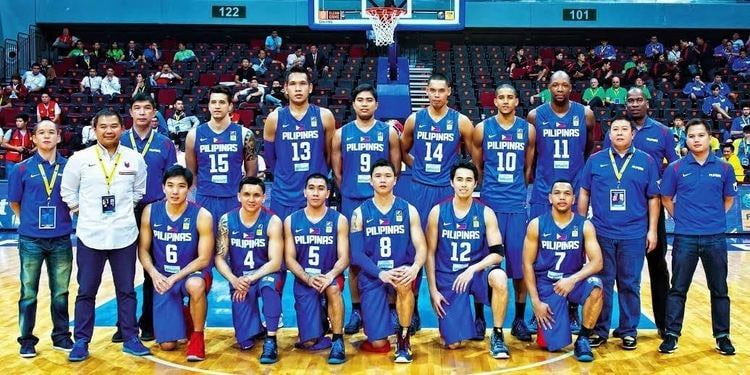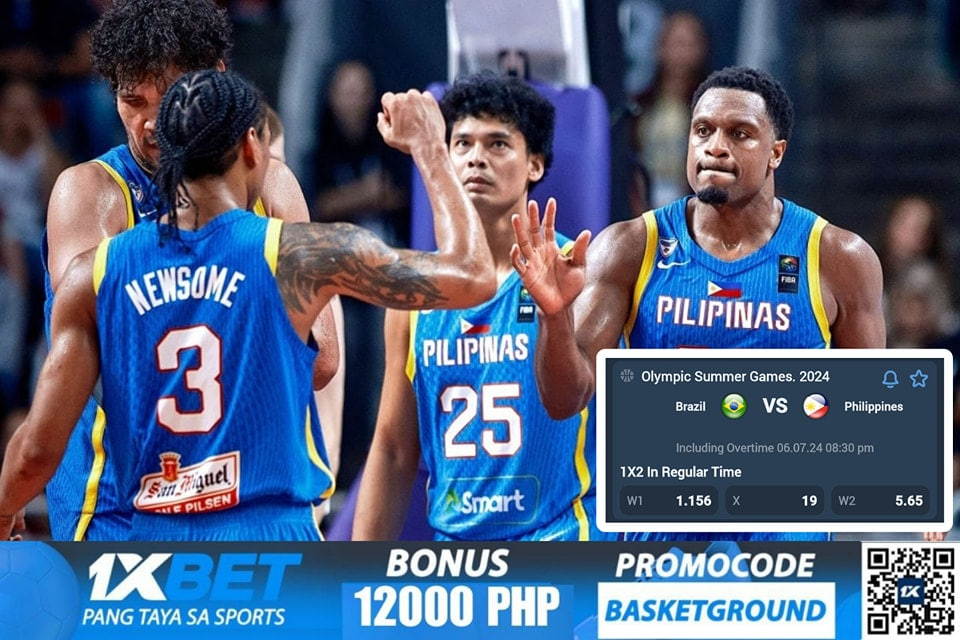Looking for the best in basketball sports betting and casino games? Check out 1xBet! We offer live basketball bets, casino games, and fantastic bonuses. Sign up now to start betting and playing!

Overview
The Philippines men’s national basketball team, commonly known as Gilas Pilipinas, represents the country in international basketball competitions. Managed by the Samahang Basketbol ng Pilipinas (SBP), or the Basketball Federation of the Philippines, this team has a rich history in both regional and global tournaments.
Achievements
The Philippines earned a bronze medal in the 1954 FIBA World Championship, marking the highest achievement by a team from outside the Americas and Europe. The team also secured a fifth-place finish at the 1936 Summer Olympics, the best performance by a men’s team from outside the Americas, Europe, and Oceania. The Philippines holds the record for the most Olympic basketball victories among nations outside the Americas, Europe, and Oceania.
In addition to the bronze medal at the FIBA World Cup and the fifth-place finish in the Olympics, the Philippines has won five FIBA Asia Cups (formerly FIBA Asia Championships), five gold medals in the Asian Games men’s basketball tournaments, eight SEABA Championships, nearly all Southeast Asian Games men’s basketball gold medals, and holds the most titles in the Southeast Asian Basketball Association men’s championship. These accomplishments cement the Philippines’ status as a powerhouse in Southeast Asian basketball and one of the continent’s top teams. The nation has participated in seven FIBA World Cups and seven Olympic Basketball Tournaments.
History

Early Years
The Philippine national team made its international basketball debut at the 1913 Far Eastern Championship Games in Tokyo, defeating China in what was the first international basketball game in Asia. The Philippines dominated the games for several years, winning all but one (1921) championship until 1934. FIBA was not established until 1932.
In 1936, the Basketball Association of the Philippines (BAP) was founded and soon became a member of FIBA. That year, the BAP sent a team called “the Islanders” to compete in the first Olympic basketball tournament in Berlin. The team won their first three matches but was defeated by the United States in the fourth game. The US team went on to win the gold medal, while the Philippines finished in fifth place, marking the best result by an Asian team in Olympic basketball history, with only one loss throughout the tournament.
The Philippines returned to the Olympics in 1948 but finished in twelfth place after a fourth-place finish in their group.
1950s–1960s
During the 1950s and 1960s, the Philippines was a dominant force in international basketball, featuring standout players such as Carlos Loyzaga, Lauro Mumar, Mariano Tolentino, Francisco Rabat, and Edgardo Ocampo. The team won the inaugural Asian Games basketball tournament in New Delhi in 1951, followed by a gold medal in the 1954 Asian Games in Manila, which also served as the qualifier for the FIBA World Championship later that year.
At the 1954 FIBA World Championship in Brazil, Loyzaga was part of the Mythical Team selection as the Philippines won the bronze medal. The team finished second in their group and lost to the US in the final round but achieved the best performance by an Asian team in the World Championship.
In 1956, the Philippines finished seventh at the Olympics after reaching the quarterfinals but losing to France, Uruguay, and Chile. The team later won its third consecutive gold medal in the 1958 Asian Games in Tokyo.
In the 1959 FIBA World Championship, the Philippines finished eighth, with notable wins in the classification round but losses to Bulgaria and Puerto Rico.
Asian Championship Era
Beginning in 1960, the Asian Basketball Championship was established to determine Asia’s representatives for the Olympics and World Championships. The inaugural Asian Championship was held in Manila. The Philippines qualified for the 1960 Rome Olympics but did not make it past the group stage, finishing 11th.
The Philippines was set to host the 1963 World Championship but missed out due to political decisions and a failed pre-Olympic tournament qualification. In the 1965 Asian Championship in Bangkok, the Philippines finished third.
Professional Era and the Rise of the PBA
In 1975, a dispute led nine teams to break away from the Basketball Association of the Philippines (BAP) to form the Philippine Basketball Association (PBA), taking many top players with them. This led to weakened Philippine teams in international competitions. The national team failed to defend its Asian Championship title in 1975 and 1977 and finished last in the 1978 FIBA World Championship.
The NCC Program (1980–1986)
To address the lack of professional players, businessman Eduardo Cojuangco, Jr. created the Northern Cement basketball team coached by American Ron Jacobs. The team achieved a fourth-place finish in the 1982 Asian Games and won the 1985 Asian Championship, which led to their qualification for the 1986 FIBA World Championship. However, the team did not participate in the World Championship due to political upheaval and instead finished third in the 1986 Asian Games.
Professional Era Resurgence
In 1989, FIBA allowed professional players, leading to a new collaboration between BAP and the PBA for national teams. In 1989, the Philippines failed to secure the gold medal at the Southeast Asian Games and finished second in the 1990 Asian Games. The team also faced challenges in subsequent Asian Championships but captured the 21st William Jones Cup championship in 1998.
Certainly! Here’s a simplified and paraphrased version of the SBP era section, using different words and making it more straightforward:
SBP Era (2007–Present)

Team Pilipinas (2007–2009)
After resolving the leadership issues that had previously led to a lack of FIBA and Philippine Olympic Committee recognition, the Samahang Basketbol ng Pilipinas (SBP) was reinstated by FIBA. A new team called San Miguel-Team Pilipinas was quickly put together for the 2007 FIBA Asia Championship in Tokushima. They managed to beat China, which didn’t send their top players, but lost to Iran and Jordan and were eliminated from the tournament. The Philippines did win the ninth-place game against China by two points. In the 2009 FIBA Asia Championship held in Tianjin, the team made it to the quarterfinals but was defeated by Jordan, who took an early lead they could not overcome. In the game for seventh place, they lost to Korea by two points.
Gilas Pilipinas (2010–Present)
Following the success of the Northern Cement team from the 1980s, the SBP launched the Smart Gilas Pilipinas program in 2010, led by SBP President Manuel V. Pangilinan. The goal was to develop a team strong enough to qualify for the 2012 Olympics. At the 2010 Asian Games, the team was again beaten by Korea in the quarterfinals. In the 2011 FIBA Asia Championship in Wuhan, the SBP succeeded in having Marcus Douthit naturalized as a player, which helped the team reach the semifinals for the first time since 1987. They lost to Jordan in the semifinals and missed out on the chance to qualify for the Olympics after losing to Korea in the bronze medal game due to missed free throws. Despite this, Smart Gilas’ performance was the best since 1987 and the best in a major Asian competition since 2002.
After failing to make it to the Olympics, the SBP decided to form a new version of the Smart Gilas team (Smart Gilas Pilipinas 2.0) made up of PBA players. In 2013, the Smart Gilas Pilipinas program was renamed Gilas Pilipinas, still sponsored by Smart Communications. The team competed in the 2013 FIBA Asia Championship held in the Philippines. After losing to Chinese Taipei in the last game of the preliminary round and finishing second, they went on to win four straight games, including a semifinal win against Korea. This success earned the Philippines a spot in the 2014 FIBA Basketball World Cup for the first time since 1978. Although they lost to Iran in the finals, they secured a silver medal, marking the first time they reached the finals of the FIBA Asia Championship since 1987.
The Philippines naturalized Andray Blatche to strengthen the team for the 2014 FIBA Basketball World Cup. With Blatche, the team had several close games against stronger teams from Croatia, Greece, Argentina, and Puerto Rico, and eventually won against Senegal in overtime for their first World Cup victory in 40 years. However, Blatche was not eligible for the 2014 Asian Games, so Marcus Douthit played instead. The team finished in seventh place at the Asian Games, their worst result in the tournament.
On October 30, 2014, the SBP announced they would form two committees to choose coaches and players for future teams, one for elite and one for youth tournaments. Chot Reyes remained as coach until a new one was appointed. The new team aimed to compete in the 2015 FIBA Asia Championship to qualify for the 2016 Rio Olympics.
Tab Baldwin was appointed as the new head coach on December 23, 2014, starting his term on January 1, 2015. Under Baldwin, the team won a silver medal at the 2015 William Jones Cup but did not win gold at the 2015 FIBA Asia Championship. They qualified for the 2016 FIBA World Olympic Qualifying Tournament but did not make it to the Rio Olympics after losses to France and New Zealand.
The team won gold at the 2016 SEABA Cup, which qualified them for the 2016 FIBA Asia Challenge. However, the Gilas Cadets, who did not include professional or naturalized players, had a poor performance and finished in ninth place due to scheduling conflicts and poor management. Chot Reyes returned as head coach in October 2016, leading the team to win the 2017 SEABA Championship and secure a spot in the 2017 FIBA Asia Cup. The team performed well in the group stage of the 2017 FIBA Asia Cup but lost in the quarterfinals, finishing the tournament in seventh place. The Philippines also defended their gold medal in the 2017 Southeast Asian Games with a victory over Indonesia.
For the 2019 FIBA Basketball World Cup, FIBA introduced a new qualification process that did not rely on continental tournaments. The Philippines faced challenges including a brawl during a July 2018 game against Australia, which led to player and coach suspensions and a fine for the SBP. Despite these issues, under coach Yeng Guiao, the team managed to qualify for the World Cup on the last day by beating Kazakhstan and getting help from a Lebanon loss to South Korea. The 2019 FIBA Basketball World Cup was a disappointment, with the Philippines losing all five of their games due to preparation problems and injuries. To recover their standing, the SBP sent an all-professional team to the 2019 Southeast Asian Games, where they won their 18th gold medal.
In the 2022 FIBA Asia Cup qualifiers, the Philippines won all six of their games, including two against South Korea. They also competed in one of the 2020 FIBA Men’s Olympic Qualifying Tournaments in Belgrade, Serbia. In the 2022 FIBA Asia Cup, the team finished third in their group but was eliminated in the first round by Japan, ending up in ninth place.
The Philippines co-hosted the 2023 FIBA Basketball World Cup with Japan and Indonesia. Even though they were automatically qualified as co-hosts, they still participated in the Asian Qualifiers. The team ended the World Cup with a 1–4 record, with their only win against China, marking their first World Cup victory on home soil since 1978.
At the 2022 Asian Games, the Philippines won their first gold medal since 1962. The team continued their success under head coach Tim Cone at the 2024 FIBA Olympic Qualifying Tournament by defeating Latvia, which was their first win in an Olympic qualifier since 1964 and their first win against a European team in a FIBA event since the 1960 Olympics. This victory extended the Philippines’ international winning streak to seven games, not including friendlies.
Our partnership with 1XBET enhances secure and efficient payment processing, ensuring quick and safe deposits and withdrawals for players.


